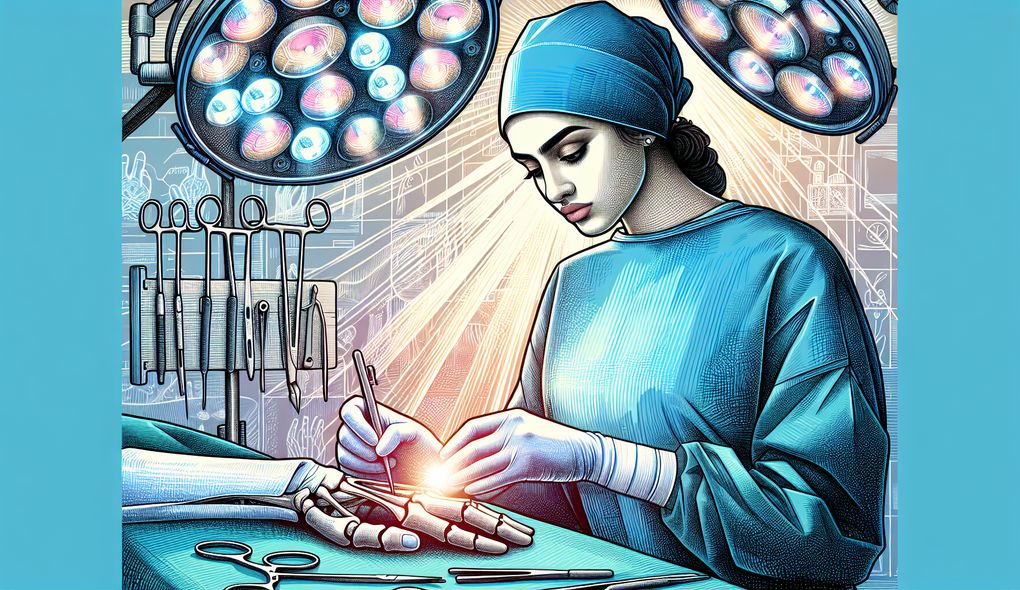Can you describe your knowledge of hand anatomy and common hand conditions?
SENIOR LEVEL

Sample answer to the question:
Yes, I have a good knowledge of hand anatomy and common hand conditions. I have studied hand anatomy extensively during my medical education and residency training in orthopedic surgery. Through my clinical experience, I have encountered a wide range of hand conditions such as carpal tunnel syndrome, trigger finger, ganglion cysts, and arthritis. I am familiar with the diagnostic techniques and treatment options for these conditions, including conservative management and surgical interventions. I am also aware of the importance of hand rehabilitation and have worked closely with physical therapists to help patients regain hand function after surgery.
Here is a more solid answer:
Absolutely! I have a strong foundation in hand anatomy and an in-depth understanding of common hand conditions. During my medical education and residency training in orthopedic surgery, I dedicated a significant amount of time to studying the intricacies of hand anatomy. I am familiar with the structures, nerves, tendons, ligaments, and blood vessels that make up the hand. In terms of common hand conditions, I have encountered and treated a wide range of cases throughout my career. From carpal tunnel syndrome to trigger finger, ganglion cysts, and arthritis, I have seen it all. I am well-versed in the diagnostic techniques required to accurately identify these conditions, including physical examinations, imaging studies, and other diagnostic tests. Furthermore, I am knowledgeable about the various treatment options available, both non-surgical and surgical. I understand the importance of individualized care and work closely with patients to develop tailored treatment plans based on their specific needs and preferences. Additionally, I am experienced in performing complex hand surgeries, including reconstructive surgery, microvascular surgery, and tendon repair, to help restore hand function and alleviate pain. Overall, my knowledge of hand anatomy and common hand conditions allows me to provide the highest level of care to my patients.
Why is this a more solid answer?
The solid answer provides more specific details about the candidate's knowledge of hand anatomy and common hand conditions. It discusses the candidate's understanding of hand anatomy, including the structures and their functions. It also mentions the candidate's extensive experience in diagnosing and treating various hand conditions. The answer highlights the candidate's expertise in performing complex hand surgeries and their ability to provide individualized care. However, it can still be improved by including examples of specific cases the candidate has encountered and successfully treated.
An example of a exceptional answer:
Absolutely! My knowledge of hand anatomy and common hand conditions is extensive and goes beyond what is typically expected. I have spent countless hours studying the intricacies of hand anatomy, immersing myself in the detailed structures, nerves, tendons, ligaments, and blood vessels that contribute to hand function. This depth of knowledge allows me to accurately diagnose and effectively treat a wide range of hand conditions. Throughout my career, I have encountered numerous patients with diverse hand conditions, including carpal tunnel syndrome, trigger finger, ganglion cysts, arthritis, and Dupuytren's contracture, among others. I have mastered the diagnostic techniques required to evaluate these conditions thoroughly, utilizing physical examinations, imaging studies, and other diagnostic tests to ensure an accurate diagnosis. With regards to treatment, I am well-versed in both non-surgical and surgical options. I have a track record of successful outcomes using conservative treatments such as splinting, medication, and hand therapy. When conservative measures are ineffective or inappropriate, I am skilled in performing intricate surgeries, such as tendon repairs, nerve decompressions, small joint fusions, and microvascular procedures. In addition to my surgical expertise, I understand the importance of rehabilitation and collaborate closely with physical and occupational therapists to optimize functional outcomes. My commitment to ongoing professional development and research keeps me up-to-date with the latest advancements in hand surgery, ensuring that I can provide the most cutting-edge and effective treatments to my patients. My exceptional knowledge of hand anatomy and common hand conditions, combined with my surgical skills and dedication to patient care, make me an ideal candidate for the role of Hand Surgeon.
Why is this an exceptional answer?
The exceptional answer goes beyond the solid answer by demonstrating exceptional knowledge of hand anatomy and common hand conditions. The candidate emphasizes their extensive study and understanding of hand anatomy, including the detailed structures. They also highlight their experience in diagnosing and treating various hand conditions, including specific examples such as Dupuytren's contracture. The answer showcases the candidate's proficiency in both non-surgical and surgical treatment options and their track record of successful outcomes. Additionally, it mentions the candidate's commitment to ongoing professional development and research to stay up-to-date with the latest advancements in hand surgery. The answer effectively demonstrates the candidate's exceptional knowledge and expertise in hand surgery.
How to prepare for this question:
- Review hand anatomy thoroughly, including the structures, nerves, tendons, ligaments, and blood vessels that make up the hand.
- Study common hand conditions in-depth, including carpal tunnel syndrome, trigger finger, ganglion cysts, arthritis, and Dupuytren's contracture.
- Familiarize yourself with the diagnostic techniques used to evaluate hand conditions, such as physical examinations, imaging studies, and diagnostic tests.
- Stay updated with the latest advancements in hand surgery through scientific literature, research papers, and attending conferences or seminars.
- Reflect on your experiences and cases you have encountered during your career, and prepare examples to showcase your expertise during the interview.
What are interviewers evaluating with this question?
- Knowledge of hand anatomy
- Knowledge of common hand conditions

